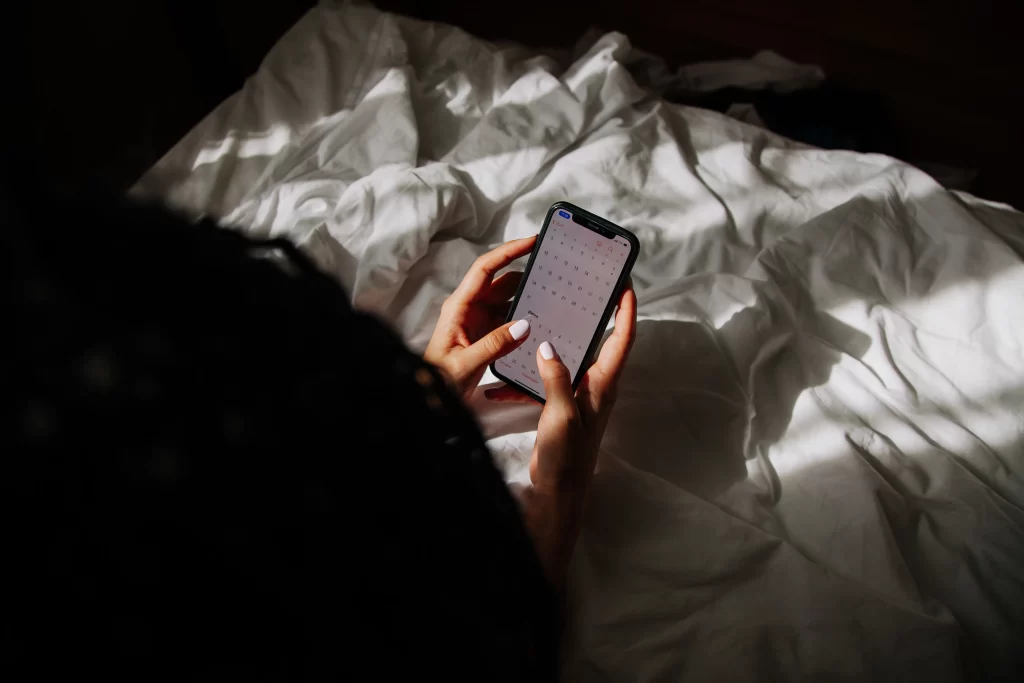How to Wake Up Early- Whether You Are a Morning Person Or Not.

Most of us hit the snooze button every once in a while. Some more often than not.
” 10 more minutes,” we lie to ourselves as we hit the snooze button on our alarm clock for the third time this week. And yes, it is only Wednesday.
You set your alarm in the evening with the best intentions and great plans for the following morning. Unfortunately, you don’t follow through. At this point, it is basically a game: set the alarm only to snooze it in the morning.
What gives?
Whether you are a morning person or not, sometimes life commitments force us to get up early. Whether it is work, kids, or other obligations. And snoozing that alarm makes our mornings more hurried, stressful, and generally more hectic.
So, how do you wake up early?
A few simple habits can make waking up feel easier and more natural. Basically, the idea is to use external cues and be consistent enough to change your circadian rhythms so that you can go to bed earlier and wake up earlier.
Why is Waking Up in The Morning So Difficult?
You might struggle to wake up in the morning for several reasons. Here are a few:
Not getting enough sleep
One of the most common reasons why most Americans struggle to wake up in the morning is sleep deprivation. If you have not slept enough, you are more likely to hit the snooze button to catch a few more minutes of sleep.
You are a night owl
“Evening people” naturally prefer to go to sleep and wake up later. Mornings can be difficult for night owls because they go to bed late, don’t get enough sleep, and are naturally inactive in the morning.
Sleep disorder
If you have a sleep disorder such as idiopathic hypersomnia or delayed sleep phase syndrome (DSPS), you might struggle to wake up in the morning. Idiopathic hypersomnia requires more hours of sleep than the average person, while DSPS causes a person to go to sleep and wake up later. Such sleep disorders can make waking up in the morning particularly difficult.
Mental health issues
Mental health issues such as stress, anxiety, and depression can also make waking up particularly difficult. This could be related to not getting enough sleep or dreading the day.

What’s with the Fuss? Why should I Wake Up Early?
Imagine getting a head start for your day. Picture yourself enjoying the quiet morning and getting time for yourself before the rest of your household and the world are awake. Isn’t this something you want to enjoy every morning?
Yes, sleeping in is fun. Your bed is warm and comfortable. But what is the fun of one or two more hours of sleep if you are going to play catch-up for the rest of the day? The early bird does really catch the worm. Waking up early ensures you are productive, calm, and fulfilled for the rest of the day. This isn’t just about ensuring you don’t snooze your alarm; it is a step to improve your overall wellness.
Tips to Wake up Early
1. Go to bed Early
Waking up early starts the night before. You need to go to bed early to catch enough hours of sleep to wake up early. Research indicates a third of Americans do not get enough hours of sleep. Enough hours of sleep is typically 7 to 9 hours of sleep.
If you want to wake up early, go to bed early, get 8 hours of sleep, and wake up early. You can’t be a night owl and expect to be up at 5 am feeling well-rested and refreshed.
Besides, some tentative data indicates going to bed early positively correlates with better health outcomes. That means the timing also matters apart from the number of hours. Those who get their sleep earlier have fewer negative health issues.
RELATED ARTICLE: TIPS TO FALL ASLEEP FASTER AND SLEEP BETTER EVERY NIGHT.
2. Limit caffeine, especially in the evening.
Consuming caffeine a couple of hours before bed is likely to disrupt sleep and, unfortunately, make it hard to wake up. If you want to wake up early, avoiding caffeine six hours before bed is best.
3. Avoid alcohol
Similar to caffeine, alcohol tends to disrupt sleep, which will have you reaching for the snooze button when your alarm goes off.
4. Eat a healthy breakfast.
Another tip that will have you wake up early and, most importantly, not go back to sleep is eating a healthy breakfast. A balanced breakfast with complex carbs and proteins is what you need to stay alert. Opt for whole grain cereals and bread, oats, eggs, healthy fats such as avocado, and fruits and vegetables.
Avoid simple carbs with high-sugar content that will likely spike your blood sugar and cause mood swings that will affect your morning routine.
RELATED: 27 PRODUCTIVE MORNING ROUTINE IDEAS FOR A MORE SUCCESSFUL DAY

5. Eat meals earlier
Another pro-tip for waking up earlier is to eat your meals earlier. Eat breakfast shortly after waking up, lunch at the same time every day, and dinner before 7 p.m. Yes, I see you rolling your eyes, thinking this is such an “old-people thing.” True, it is, but do you see how early they wake up? Eating earlier can improve your sleep schedule.
Basically, eating earlier affects our circadian rhythms. Circadian rhythms are fluctuations that occur in our bodies during our 24-hour days. These rhythms influence when we feel tired and sleepy. A number of things affect our circadian rhythms, from light exposure and meals to physical activity and relaxation routines.
Eating earlier affects your circadian rhythm, making you feel sleepy earlier. And as mentioned, falling asleep earlier is an important prerequisite to waking up early.
6. Physical exercise, but strategically
Regular physical exercise generally improves the quality of sleep. However, it is necessary to exercise strategically. For instance, you cannot exercise close to your bedtime. In fact, that exercise will make it more difficult to fall asleep.
If you are a morning person, you can exercise in the morning. This will improve your energy and alertness during the day and help you fall asleep easily at night.
If you are an evening person, exercising a couple of hours before bed will help you sleep early and wake up refreshed.
If you are a morning person and prefer to work out in the evening, you should try to test it out since tentative research indicates that when a morning person works out in the evening, it means trouble falling asleep.
In any case, experiment and find the best time for you. Just remember, exercise a couple of hours before bed.
7. Avoid exposure to light before bed.
We mentioned circadian rhythms earlier and how they are affected by light exposure.
Simply put light exposure before bed affects your circadian rhythm and production of melatonin, making it difficult to fall asleep early.
To wake up early, avoid screens in the evening, use blackout curtains, dim the lights in your home, and if you must use a digital device, use blue-light-filtering glasses.
RELATED ARTICLE: THE BENEFITS OF SLEEP SYNCING AND HOW TO SYNC YOUR BODY CLOCK.
8. Expose yourself to light in the morning.
Similar to avoiding light before bed, exposure to light in the morning alters your circadian rhythms.
Basically, by exposing yourself to light, you are regulating your internal clock by curbing the production of the sleep-inducing hormone melatonin. This is sort of telling the body it is time to wake up. If it is still dark when you wake up at 5 a.m., you can opt to use a broad-spectrum light. With time, your body will start to wake up around this time naturally.

9. Relax Before Bed
Winding down one or two hours before bed with a relaxing evening routine prepares your body for sleep. Create a relaxing evening routine that includes simple activities, from simple stretches such as somatic stretching or yoga to meditation and reading.
Stop focusing on goal-oriented activities, such as a work deadline or those emails. Tuck your devices away. Use this time to wind down and prepare for sleep.
10. Whatever you do, be consistent.
Consistency is essential if you want to wake up earlier. This means going to bed and waking up at the same time every day, including weekends. As mentioned, you can slowly train your internal body clock.
Consistency is how you train and eventually maintain your circadian rhythms. This consistency extends beyond just when you go to bed and wake up. It also encompasses when you eat relative to when you go to bed.
11. If You must, nap in the middle of the day or early afternoon
Even with the best routine, it is possible that some nights you do not get your 7 to 8 hours of sleep. And in some instances, even when you get 8 hours of sleep, you still feel sleep-deprived when you wake up.
Naps are a great way to catch up on sleep.
However, be cautious. Nap in the middle of the day or early afternoon. And keep it under one hour. If you nap longer or later in the day, you will find it difficult to fall asleep at night.
12. Don’t make drastic changes.
If you need to change your routine, don’t make drastic changes. If you used to wake up at 7 a.m. and need to wake up at 5 a.m., don’t try to cut the 2 hours. Do it gradually. Wake up 15 or 30 minutes earlier than 7 a.m. for a couple of days. Get used to that, then do another 15 minutes for a couple of days. Do this until you hit your 5 a.m. goal.
13. Put your alarm far from the bed.
This is a simple trick that can help you avoid the snooze button. When the alarm is next to your bed, you can hit the snooze button and go back to sleep. But if you have to get out of bed to turn it off physically, you are forced to get out of bed, and by then, you are already awake.
14. Make use of technology.
We have apps for almost everything right now.
Use a sleep app or a journal to track your sleep patterns to ensure you get 7- 9 hours of sleep every night. Some apps can track your patterns and wake you up when you are in your lightest sleep phase, making the early morning rise easier.
Similarly, you can use apps such as Spotify to create wake-up playlists that will make your morning routine fun.

15. Try melatonin supplements if you have to
If you are still having trouble falling asleep and waking up earlier, try melatonin supplements.
Your body naturally produces melatonin, which stimulates sleep. You can also take melatonin supplements to help reorient the body clock.
Keep in mind you cannot use melatonin for sleep disorders.
In fact, if you believe there are any underlying medical conditions affecting your sleep schedule you should see a doctor.
Here are a few other natural remedies to help you fall asleep faster and wake up earlier.
Our take?
Waking up early and getting on the popular 5am routine doesn’t have to be hard. Even if you are not naturally a morning person, taking advantage of external cues and changing your habits can make waking up a breeze.
FAQ
How can I wake up at 5am?
To wake up at 5am you need a few lifestyle and habits adjustments.
First, to wake up at 5 a.m. and get the recommended 7 to 9 hours of sleep, you must sleep between 8 pm and 10 pm. Create a relaxing bedtime routine one or two hours before bed. Start by gradually setting your alarm 15-30 minutes earlier every day until you hit your goal. Ultimately, training to wake up at 5am daily requires consistency and patience coupled with good sleep hygiene practices.
How early should I sleep to wake up at 5am
You should sleep around 8pm to 10pm. The recommended sleep quantity for an adult is 7 to 9 hours. So you need to sleep at around 8pm and 10pm to get your 7 to 9 hours and wake up at 5pm.